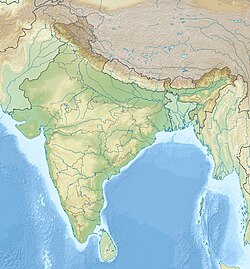The Chari Formation is a Jurassic (Callovian to Oxfordian) geologic formation in Gujarat, western India.[1] Dinosaur remains are among the fossils that have been recovered from the formation, although none have yet been referred to a specific genus.[2] The ammonite Reineckeia has also been found here. The skulls of two marine crocodiles have also been found and have been putatively identified as Steneosaurus.[3]
| Chari Formation | |
|---|---|
| Stratigraphic range: Callovian-Oxfordian ~ | |
| Type | Geological formation |
| Sub-units | Dhosa Conglomerate, Dhosa Oolite & Dhosa Sandstone Members |
| Lithology | |
| Primary | Limestone, siltstone, sandstone |
| Other | Oolite |
| Location | |
| Coordinates | 23°30′N 69°24′E / 23.5°N 69.4°E |
| Approximate paleocoordinates | 23°36′S 32°36′E / 23.6°S 32.6°E |
| Region | Gujarat |
| Country | |
| Type section | |
| Named for | Chari, "salt affected" |
Paleobiota
editDinosaurs
edit- Sauropods
| Sauropods of the Chari Formation | |||||
|---|---|---|---|---|---|
| Genus | Species | Locality | Material | Notes | Photos |
| Sauropoda[4] | indet | Jumara | Proximal part of hindlimb. | A Sauropod | |
Pseudosuchians
edit| Pseudosuchians of the Chari Formation | |||||
|---|---|---|---|---|---|
| Genus | Species | Locality | Material | Notes | Photos |
| ?Steneosaurus[3] | sp. | Dhosa Oolith | Two Skulls. | A Teleosauridae Pseudosuchian. | |
Invertebrates
edit- Mollusca
| Molluscas of the Chari Formation | |||||
|---|---|---|---|---|---|
| Genus | Species | Locality | Material | Notes | Photos |
| Choffatia[4] | C. pardagatus | Jumara | A Perisphincitidae Ammonite. | ||
| C. cobra | |||||
| Indosphinctes[4] | I. indica | Jumara | A Perisphincitidae Ammonite. | ||
| Phlycticeras[4] | sp. | Jumara | A Strigoceratidae Ammonite. | ||
| Reineckeia[4] | R. anceps | Jumara | A Reineckeiidae Ammonite. | ||
See also
editReferences
edit- ^ Chari Formation at Fossilworks.org
- ^ Weishampel, et al. (2004). "Dinosaur distribution." Pp. 517-607.
- ^ a b Phansalkar, V. G.; Sudha, G.; A. S., Khadkikar (1994). "Giant marine reptilian skulls from the Jurassic of Kachchh, Gujarat". Current Science. 67(6): 460–461.
- ^ a b c d e Jana, Sudipta K.; Das, Shiladri (2002-01-10). "A report of a 157.8 m.y.-old dinosaur bone from the Jurassic marine Chari Formation, Kutch, Gujarat and its taphonomic significance". Current Science. 82 (1): 85–88.
Bibliography
edit- Weishampel, David B.; Dodson, Peter; Osmólska, Halszka (2004), The Dinosauria, 2nd edition, Berkeley: University of California Press, pp. 1–880, ISBN 0-520-24209-2, retrieved 2019-02-21
Further reading
edit- R. Dutta and S. Bardhan. 2016. Systematics, endemism and phylogeny of Indian proplanulitins (Ammonoidea) from the Bathonian–Callovian of Kutch, western India. Swiss Journal of Paleontology 135:23-56
- M. Alberti, D. K. Pandey, and F. T. Fürsich. 2011. Ammonites of the genus Peltoceratoides Spath, 1924 from the Oxfordian of Kachchh, western India. Neues Jahrbuch für Geologie und Paläontologie, Abhandlungen 262:1-18
- S. S. Das, S. Bardhan, and T. Kase. 2005. A new pleurotomariid gastropod assemblage from the Jurassic sequence of Kutch, western India. Paleontological Research 9(4):329-346
- F. T. Fürsich, D. K. Pandey, W. Oschmann, A.K. Jaitly, and I.B. Singh. 1994. Ecology and adaptive strategies of corals in unfavourable environments: Examples from the Middle Jurassic of the Kachchh Basin, western India. Neues Jahrbuch für Geologie und Paläontologie, Abhandlungen 194(2–3):269-303
- D. N. Ghosh. 1990. Biometry of two species of Kallirhynchia (Buckman) from Callovian beds of Kutch, India. Brachiopods Through Time 97-100

